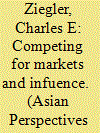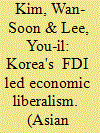| Srl | Item |
| 1 |
ID:
082255


|
|
|
|
|
| Publication |
2008.
|
| Summary/Abstract |
This article discusses the asset acquisitions of Asian national oil companies (NOCs) in the energy-rich states of Russia and Central Asia, and considers the implications for economic and geopolitical stability. Asian NOC investment in these countries is analyzed in terms of state-level political and economic relations, as well as the regional and local impact of NOC activity on the host country. Asian NOCs, and the governments that support them, face few political obstacles in dealing with Eurasia's authoritarian regimes. Asian companies operate in business cultures similar to those in Eurasia, and have fewer reservations about engaging in bribery or corruption than their Western counterparts. These advantages are offset by the entrenched position of Western and Russian oil companies, and a strong commitment of the host states to political and economic independence
|
|
|
|
|
|
|
|
|
|
|
|
|
|
|
|
| 2 |
ID:
082256


|
|
|
|
|
| Publication |
2008.
|
| Summary/Abstract |
This article argues that Korea's prevailing strong belief in self-sufficiency and the legacy of the state-led and overly regulated external policies which dominated prior to the 1997 financial crisis had become an obstacle to Korea's seeming pursuit of economic liberalism based on inward foreign direct investment (FDI). Although the momentum of globalization ignited during the 1997 financial crisis has enabled Korea to undertake a speedier market opening and draconian structural reforms, there has been no fundamental turnaround yet in the mindset of the Korean government, bureaucrats, corporate sector, or the people in general-the ultimate measure of globalization. This article critically evaluates the impacts of the legacy of the state-led economic development (economic nationalism/mercantilism) model on Korea's newly adopted FDI-led globalization strategy.
|
|
|
|
|
|
|
|
|
|
|
|
|
|
|
|